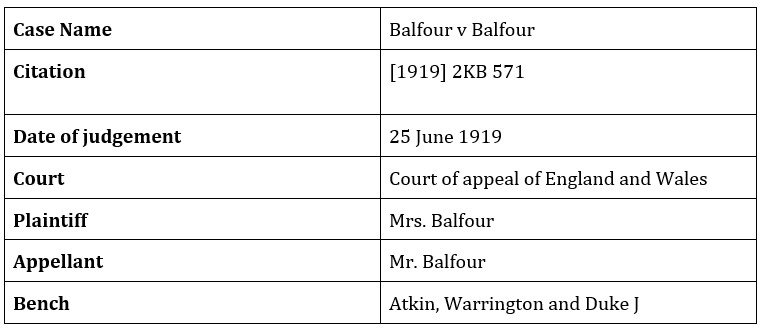
This article is written by Monika Berar of BA.LL.B., 6th Semester, RNB Global University, Bikaner.

Facts of the Case
A couple named Mr. Balfour and Mrs. Balfour lived in Ceylon ( Sri Lanka) and in 1915 they went to England for Vacation.
During their vacation, Mrs. Balfour fell ill and she was in urgent need of medical treatment. Then, both of them decided that Mrs. Balfour will stay in England and get back to Mr. Balfour when she recovers from her sickness. Also, Mr. Balfour mentioned that he will pay maintenance of 30 pounds on monthly basis until she recovers from illness and gets back to Ceylon.
With time, the relationship between Mr. Balfour and Mrs. Balfour deteriorates and he stops paying monthly maintenance to her. Mrs. Balfour decided to file the suit for the enforcement of the agreement and she went to the Court.
Mr. Balfour wrote to his wife, suggesting that the separation be made permanent.And at a later date, they legally separated by divorce.
Mrs. Balfour had sued in court in 1918 for failing to make outstanding payments.
Issue raised
Whether the contract between Mr. and Mrs. Was Balfour valid or not?
Procedural history
Initially the case was filed by Mrs. Balfour in the Court to seek an order for maintenance, where the court held that the husband is liable to provide maintenance to her wife. Court also held that consideration to the agreement is that only monthly transfers are lawful.
Mr. Balfour appealed in the higher court.
Plaintiff argument
According to the Case law, Mr. Balfour’s commitment to pay his wife Mrs. Balfour’s monthly expenditures was only a domestic arrangement and not a binding contract, and the husband had no intention of making it a contract under the law. That ultimately results in Mr. Balfour v. Mrs. Balfour, meaning that his wife later appeared in court.
Defendant argument
According to the Balfour v. Balfour case study, the wife is regarded to get the agreed-upon sum of money because the husband offered his wife £30 as part of a domestic contract, and she accepted and remained in England.
Judgement
The question at hand is whether a spousal contract can be enforced or if it is merely a social arrangement. Mrs. Balfour sued her husband for failure to uphold his vow rather than because he owed her a social obligation as their spouse, the point is made clear. According to the rule that governs, we must consider if an agreement satisfies all of the requirements listed below in order to decide whether it is legally enforceable:
- Offer & Acceptance
- intention of establishing a legal obligation
- Consideration
- Parties’ Competence
- Free consent
The Appellate Court held that agreement between the parties is not enforceable as there was no intention of establishing a legal relationship, so, this is not a Contract. In this case, Justice Atkin also mentioned that the agreement between married couples, spouses are social or domestic agreements and cannot be enforceable in the courts.
Hence, there was no contract exists between Mr. and Mrs. Balfour.
Analysis
This concept came in the 19th century, in an agreement, when there is no intention to create a legal relationship then there is no contract between the parties.
This case was also cited in the case Jones V Padavatten, Simpkins V pays.




0 Comments